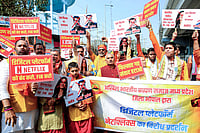India ranked 161st out of 180 countries on World Press Freedom Index 2023. Over the last few years, the entire world has borne witness to the crackdown on press in the country. As the strictures of news censorship continue to broaden, the sleek line separating propaganda from news continues to diminish in a society further plagued by the contagious affliction of fake news. With the Parliament passing the three legislations-
While experts have expressed their strong disapproval over the ambiguity of words concerning the bills passed, the laws lay the footprint for absolute state vigilance over media of any form and especially, on independent digital news media platforms. In an age where the ambit of 'broadcast' has stretched by miles, the new legislations doctor this very ambiguity to their favour when it comes to state's control over "news and current affairs programmes".
The 2023 Telecommunications Act also allows the state to suspend programmes on broadcast and online platforms keeping national security in mind, while loosely expanding the definition of telecommunication services. This inevitably opens numerous inroads towards the existing space of independent news and fact-checking organisations who have been instrumental in fending off fake news, propaganda news and fabricated facts over the last decade. With the new biometric registration imposition on acquiring any telecommunication service, privacy is to be fundamentally affected with the pooling of biometric information with government agencies. The bill which was touted as a much-awaited replacement of The Telegraph Bill of 1885, comes as old wine in a brand new bottle with strategic cosmetic changes. According to experts, independent media stakeholders and opposition critics, the bill, in turn, goes back to archaic rules of taking holistic control of the telecommunication services and issuing authorisation accordingly - just to monitor and streamline the flavour, need and value of the content.
As mentioned in a report by the Indian Freedom Foundation written by Tejasi Panjiar and Pratik Waghre "Clause 20 in the Telecom Bill, 2023, whether it is the Union government’s power to temporarily possess, suspend, intercept, detain any telecommunication service [20(1)(a)], to intercept, detain, disclose, or suspend any message or class of messages [20(2)(a)], to direct suspension of any telecommunication service or class of telecommunication [20(2)(b)], or to notify encryption and data processing standards [19(f)], cements the colonial powers of the Union government, which upon misused and if extended to internet services, may become nothing less than draconian."
India has wtinessed the bloom of independent news organisations from an alternate media space to custodians of free press in India which has utilised social media platforms and their digital traction to reach to a wide spectrum of readers/consumers of content. The calculated crackdown on the existing structures has seen numerous instances of journalists being arrested on the grounds of causing threat to national security. Mohammed Zubair, co-founder of the independent fact-checking platform, AltNews and someone who has stood firm in the fight against propaganda and fake news, was arrested last year for a four-year old tweet where he took a humorous dig at the Government's censorship based on sanskaari Hindutva lines. Zubair was arrested om the grounds of being highly provocative and insulting. This year witnessed numerous raids on the houeses and offices of journalists linked with NewsClick, an independent news media organisation sharply critical of the government and its strategies, leading to the arrests of founder Prabir Purkaysatha and HR head Amit Chakravarty under the Unlawful Activities (Prevention) Act (UAPA). These laws with their professed utility and cleverly structured ambiguity, thus, walk another mile in faciliataing unilateral clamp downs on independent news media platforms which have already been the primary targets over the last few years.
In answer to the laws coming to force, numerous parties and industry stakeholders signed an open letter to Ashwini Vaishnaw urging the Department of Telecommunications to withdraw the bill as it "imperils encryption, a crucial tool for privacy and free expression; amplifies unchecked powers of the government to impose internet shutdowns; and enhances surveillance without independent oversight." The letter goes on to explain how the Bill poses a grave threat to fundamental rights and loosens the very base of a democracy, enlisting the points on endangering encryption, ramping up surveillance powers, and increasing the power to suspend telecommunication services without any checks or balances instead of addressing the issue of internet shutdowns, touching upon effectively on other salient points.























